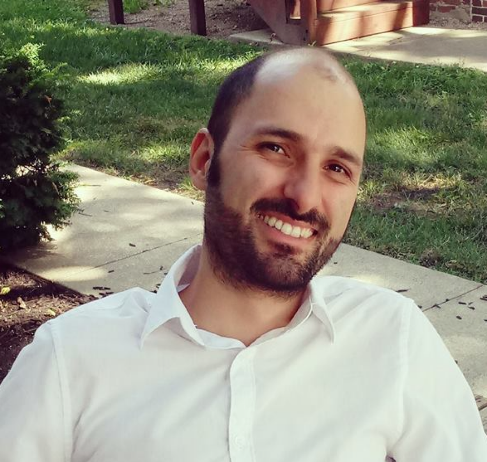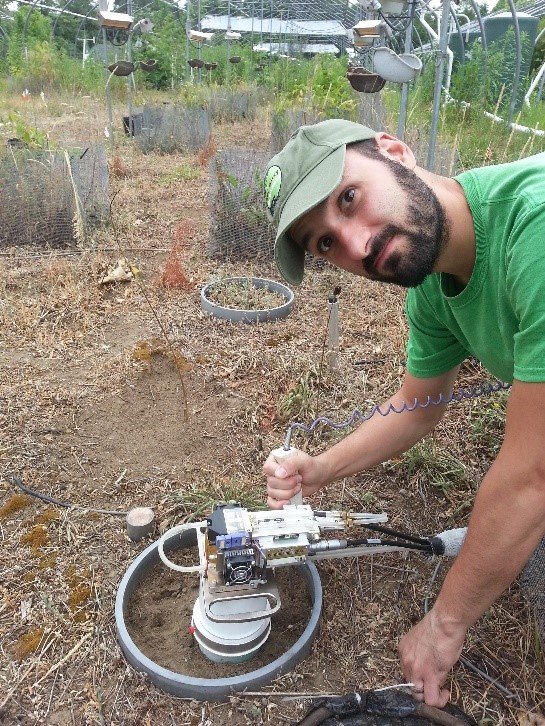
PhD in Biological Sciences, Purdue University
MSc in Biotechnology, Universidad Nacional de Colombia - Medellín
BSc in Biological Engineering, Universidad Nacional de Colombia - Medellín


PhD in Biological Sciences, Purdue University
MSc in Biotechnology, Universidad Nacional de Colombia - Medellín
BSc in Biological Engineering, Universidad Nacional de Colombia - Medellín
What was your research topic? What results did you get?
During my doctorate studies, I investigated how microorganisms regulate carbon cycling in soil and how understanding this can help us to predict changes in the Earth’s biogeochemistry (e.g. soil nutrients) and climate. Understanding the accelerated changes that the planet is experiencing and using that information to design adaptation and mitigation strategies is an unprecedented priority for humanity.
When microorganisms in soil decompose organic matter, they emit CO2 into the atmosphere. This process is known as soil respiration. Each year, soils emit approximately 95 trillion tons of carbon to the atmosphere. In the last decades, global soil respiration has been increasing at a rate of 100 million tons of carbon every year. Recent evidence suggests that increases in global soil respiration could be associated with responses of soil microorganisms to global warming and other changes in climate. Understanding these responses can help us to predict how much carbon is going to be emitted from soils in a warmer future and how that is going to affect the Earth’s climate.
In my thesis, I studied the responses of soil microorganisms to changes in environmental conditions such as temperature and moisture, and the consequences of these responses for soil CO2 emissions. To do this, I used different laboratory, field, and modeling techniques. Much of my work was focused on understanding how changes in the environment cause microorganisms in the soil to be metabolically active (i.e. eating, growing, and respiring) or inactive (i.e. in a state of dormancy where they do not decompose organic matter and minimize their respiration). In general, I found that rapid changes in soil respiration rates (i.e. respiration pulses after wetting dry soil) are partly caused by activation of dormant microorganisms in the soil and not by rapid changes in the total amount of microorganisms in soil, as is generally assumed.
Together with several collaborators, we modified a mathematical model (such as those used to make climate predictions and inform policies such as those discussed in the Paris agreement) to account for microbial dormancy and found that models that do not consider activation and deactivation of microorganisms in soil underestimate soil CO2 emissions, especially under warming and drought conditions.
In conclusion, the results of my thesis suggest that climate-driven activation of dormant microorganisms in soil could be contributing to increase global soil respiration and to accelerate global warming. An intensification of global warming, as projected for the following decades, could further stimulate microbial activity and respiration in soil.

“Since I was an undergraduate student, I have been passionate about understanding those little life forms that we call microorganisms, that are everywhere, and that together form the oldest, most abundant, and most diverse group of living organisms on Earth. My PhD project allowed me to learn more about them and about how they contribute to shape the world that we live on.”
What were the most difficult and the most gratifying aspects of your studies?
The hardest part of my studies was planning my thesis project: defining the questions and the reasons that motivated each chapter of my thesis, the most appropriate methodologies to address those questions, and the schedule to execute my project.
The most rewarding part is what I Iearned and the completion of my research project.
What are your plans after graduation?
For the next two years, I will be working as a postdoctoral researcher at the University of Iceland. The project in which I am going to work also aims to understand the responses (in this case, nitrogen fixation) of soil microorganisms to the environment and the ecological consequences of these responses. After that, I hope to work in academia and research in Colombia.
Contact information:
Last modified: June 28, 2023